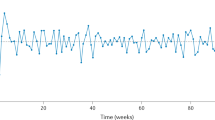Abstract
A paradigm shift in economics is taking place. In traditional, neoclassical economics a representative agent who behaves perfectly rational has been the main working hypothesis and mathematical analysis of simple tractable models its main focus. A problem with this approach is that it requires unrealistically strong assumptions about individual behaviour, such as perfect knowledge and information about the economy and extremely high computational abilities to do what is optimal. An advantage of the neoclassical research programme, partly explaining its success, is that rationality imposed through optimizing behaviour and model consistent expectations enforces strong discipline on the modelling framework leaving no room for market psychology and unpredictable, irrational behaviour.
An alternative complexity view is now emerging, based on interaction of many heterogeneous agents, whose behaviour is only boundedly rational. In this new behavioural agent-based approach, computer simulation models are the main modelling framework. An advantage is that it becomes possible to describe in detail individual behaviour at the micro level based on realistic assumptions. The Santa Fe conference proceedings Anderson et al. (1988) and Arthur et al. (1997a) contain many contributions within the complexity view. The recent Handbook of computational economics (Tesfatsion and Judd 2006) contains many chapters describing the state of the art of agent-based economics. There is however still an important problem with the bounded rationality research programme: it leaves too many degrees of freedom. There is only one way (or perhaps a few ways) one can be right, but there are many ways one can be wrong. To turn the alternative view into a successful research programme, one has to “tame the wilderness of bounded rationality”.
Access this chapter
Tax calculation will be finalised at checkout
Purchases are for personal use only
Similar content being viewed by others
References
Anderson PW, Arrow KJ, Pines D (eds) (1988) The economy as an evolving complex system II. Addison-Wesley, Reading, MA
Anufriev M, Hommes CH (2009) Evolution of market heuristics. Knowl Eng Rev, forthcoming
Arthur WB, Durlauf SN, Lane DA (eds) (1997a) The economy as an evolving complex system II. Addison-Wesley, Reading, MA.
Arthur WB, Holland JH, LeBaron B et al. (1997b) Asset pricing under endogenous expectations in an artificial stock market. In: Arthur W, Lane D, Durlauf S (eds) The economy as an evolving complex system II. Addison-Wesley, Reading, MA, pp 15–44
Boswijk HP, Hommes CH, Manzan S (2007) Behavioral heterogeneity in stock prices. J Econ Dyn Control 31:1938–1970
Brock WA, Hommes CH (1997) A rational route to randomness. Econometrica 65:1059–1095
Brock WA, Hommes CH (1998) Heterogeneous beliefs and routes to chaos in a simple asset pricing model. J Econ Dyn Control 22:1235–1274
Evans GW, Honkapohja S (2001) Learning and expectations in macroeconomics. Princeton University Press, Princeton
Fama EF, French KR (2002) The equity premium. J Finan 57:637–659
Hommes CH (2006) Heterogeneous agent models in economics and finance. In: Handbook computational economics, vol 2: Agent-based computational economics. Elsevier, Amsterdam, pp 1109–1186
Hommes CH, Sonnemans J, Tuinstra J, et al. (2005) Coordination of expectations in asset pricing experiments. Rev Financial Stud 18:955–980
Sargent TJ (2008) Evolution and intelligent design, Am Econ Rev 98:5–37
Shiller RJ (2000) Irrational exuberance. Princeton University Press, Princeton
Tesfatsion L, Judd KL (eds) (2006) Handbook of computational economics, vol 2: Agent-based computational economics. Elsevier Science, Amsterdam
Tversky A, Kahneman D (1974) Judgment under uncertainty: heuristics and biases. Science 185:1124–1131
Author information
Authors and Affiliations
Editor information
Editors and Affiliations
Rights and permissions
Copyright information
© 2009 Springer-Verlag Berlin Heidelberg
About this chapter
Cite this chapter
Hommes, C. (2009). Complexity, Evolution and Learning. In: Reggiani, A., Nijkamp, P. (eds) Complexity and Spatial Networks. Advances in Spatial Science. Springer, Berlin, Heidelberg. https://doi.org/10.1007/978-3-642-01554-0_7
Download citation
DOI: https://doi.org/10.1007/978-3-642-01554-0_7
Published:
Publisher Name: Springer, Berlin, Heidelberg
Print ISBN: 978-3-642-01553-3
Online ISBN: 978-3-642-01554-0
eBook Packages: Business and EconomicsEconomics and Finance (R0)




